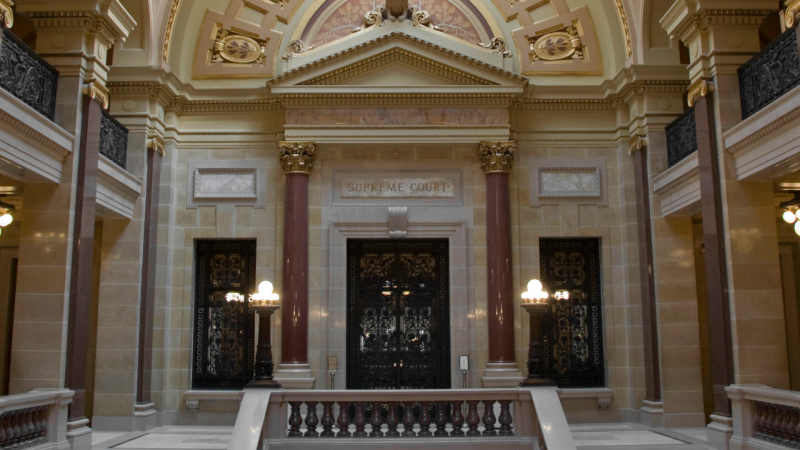Dem Gov. Tony Evers says he was compelled to sue the state Legislature after GOP lawmakers decided to “stick it” to UW employees by holding up their pay raises over a policy dispute.
The suit, which asks the state Supreme Court to take the case directly, seeks to overturn three committee actions, including the move to block the raises at the behest of Assembly Speaker Robin Vos, R-Rochester.
In it, Dem AG Josh Kaul denounced the “current system of government-by-legislative-committee” and accused lawmakers of exceeding their constitutional authority.
The GOP-controlled Legislature has repeatedly used its oversight powers to block various actions by the Evers administration since the guv took office nearly five years ago. That includes the Joint Committee for Review of Administrative Rules blocking various proposals and the Joint Finance Committee halting stewardship land purchases. Both actions are also targeted in Tuesday’s suit.
>> WisPolitics is now on the State Affairs network. Get custom keyword notifications, bill tracking and all WisPolitics content. Get the app or access via desktop.
But Evers said the move earlier this month to block the pay increases, which were already funded in the state budget, was the last straw. The budget included funding for a 4% percent raise effective July 2 of this year with a second bump of 2% on June 30 next year.
Evers said that was the inspiration for the suit, not the change earlier this year of the Supreme Court’s composition to give liberals a 4-3 majority.
“It’s one thing to mess around with a decision made about purchasing land. But when you mess with people’s lives like that, that was the coup de grâce,” Evers said after a news conference to promote the opening of the open enrollment period for health care coverage through the health insurance marketplace.
Senate Majority Leader Devin LeMahieu, R-Oostburg, knocked the suit as “frivolous” and accused Evers of “working to diminish the voice of Wisconsinites by limiting the authority of the legislature and unduly strengthening his own administration.”
Vos suggested in a statement that the lawsuit was an attempt to eliminate the 4% raises the Joint Committee on Employment Relations approved for non-UW state employees this fall, though it doesn’t ask the Supreme Court to overturn that action. Vos’ contention is based on the suits’ request to invalidate the process now used to approve employee raises, which could overturn what JCOER approved this fall.
“In a time of unprecedented inflation brought on by reckless Democrat spending, we think it is abhorrent that the Governor would try and take away lawfully approved money for hardworking state employees,” Vos said.
Evers said he gave Universities of Wisconsin President Jay Rothman a heads-up on the action, but stressed, “This is my lawsuit.”
Vos told WisPolitics in September that he would block UW raises unless the university eliminated DEI positions and vowed to not give the university “one nickel” until it complied with his demand. As the Joint Committee on Employment Relations earlier this month declined to take up pay raises for UW employees, Vos said he offered to allow the hikes to go through if the university administration agreed not to create any new positions without legislative approval.
Following Evers’ announcement, Rothman said in a statement “it was unprecedented to withhold pay from our employees as part of a political disagreement between two separate branches of government.” He added the decision to target pay raises in order to compel the elimination of DEI positions after Evers vetoed a similar directive “left us in an incredible predicament.”
“I am deeply troubled by our faculty and staff being stuck in the middle of this dispute,” Rothman said. “While it is not our lawsuit, it’s time for this whole ordeal that is blocking pay for our employees to come to an end.”
The suit argues the Legislature exceeded its authority by using the committee process to create “legislative vetoes” rather than putting the objection into a bill passed by both houses and submitted to the guv.
Along with the UW pay raises, the lawsuit targets three other committee actions: the Joint Finance Committee blocking conservation projects; and the Joint Committee for Review of Administrative Rules nixing an update to the state’s commercial building standards and a policy declaring it malpractice for medical professionals to practice conversion therapy.
According to the suit, the Finance Committee has blocked almost a third of the stewardship projects the Department of Natural Resources has submitted for review.
Meanwhile, JCRAR has twice blocked attempts by the Evers administration to place a de facto ban on conversion therapy.
Both times, GOP leaders put the objections into legislation that was placed on the calendar of each house. But they were sent back to committee rather than brought up for a vote to uphold the committee’s suspension of the rule. It avoided sending the bills to Evers, who would’ve likely vetoed them.
The suit notes the Supreme Court in 1992 upheld the powers of JCRAR to suspend an administrative rule. But the suit argues the court wrongly assumed several things, including that a bill would closely follow a JCRAR suspension to put the issue before the full Legislature. The suit also noted in 2017 lawmakers passed a law allowing them to suspend a rule multiple times without a vote by the full Legislature.
The suit argues the “legislative vetoes” violate the Wisconsin Constitution by giving committees powers to decide how to administer laws that are reserved for the executive branch. The suit also argues that the process allows lawmakers to effectively change the law outside the normal process that requires a bill to pass both houses and be presented to the guv.
The suit notes similar requirements in other states have been overturned by their state supreme courts.
“It is time to return Wisconsin to the mainstream,” the suit says.
See the release here.
See the petition for original action here.
Read the brief here.
See the press release page for reaction from lawmakers here.



